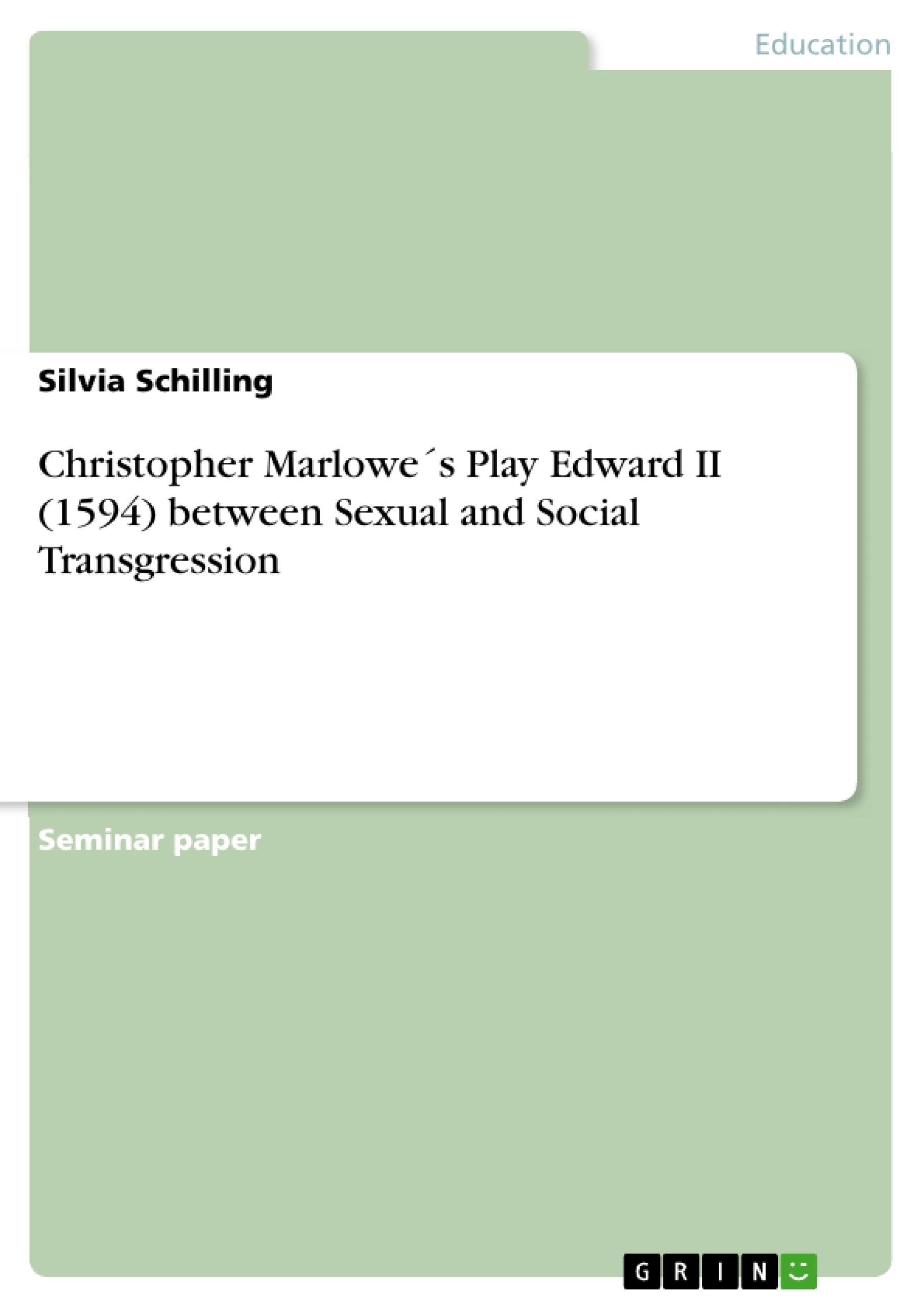The play "Edward II" by Christopher Marlowe is a tragedy that depicts King Edward's reign, his forced abdication, and his death as well as the rise and fall of King Edward´s opponent Mortimer Junior. The respective relationships of these men play a major role in their development, which is why this paper focuses on the homoerotic relationship of King Edward and Gaveston as well as on the relationship of Queen Isabel and Mortimer Junior. Analyzed will be sexual and social transgressions as well as their effects which drive the plot forward.
Table of Contents
- Introduction
- King Edward II and Gaveston
- Sexual Transgressions
- Social Transgressions
- The Distribution of Power
- The Monarch-Subject Bond
- The Image of the King
- Queen Isabel and Mortimer Junior
Objectives and Key Themes
This essay examines Christopher Marlowe's Edward II, analyzing how the play intertwines sexual and social transgressions to drive the plot and shape the tragic fate of King Edward. The analysis focuses on the relationship between Edward and Gaveston, and later, Isabel and Mortimer, exploring how their actions challenge established power structures and social norms.
- The interplay between private sexual relationships and public political consequences.
- The transgression of social hierarchies and the resulting political instability.
- The consequences of a monarch's disregard for his duties and responsibilities.
- The ambiguous nature of Edward and Gaveston's relationship and its interpretation within Elizabethan society.
- The role of power dynamics in shaping and defining transgression.
Chapter Summaries
Introduction: This introductory chapter sets the stage for the essay by defining "transgression" and establishing the theoretical framework for analyzing the play. It highlights the play's exploration of the problematic entanglement of sexual and social transgressions, particularly within the relationship of Edward II and Gaveston, and the subsequent consequences. The importance of understanding the Elizabethan context surrounding sodomy and its broader implications is stressed, framing the discussion of the play’s themes within the social and political landscape of the time.
King Edward II and Gaveston: This chapter delves into the complex relationship between King Edward II and Piers Gaveston, examining both its sexual and social transgressive aspects. The ambiguity of their relationship is highlighted, questioning whether it is purely platonic or overtly sexual, acknowledging the interpretative flexibility of Marlowe’s writing. The chapter explores how the relationship's public nature fuels social transgression, particularly concerning the distribution of power and the breach of the monarch-subject bond. Gaveston's rapid ascent and the resentment it sparks among the nobility are discussed, emphasizing the consequences of this defiance of established social order.
Keywords
Edward II, Gaveston, Isabel, Mortimer, transgression, sexual transgression, social transgression, power, monarchy, Elizabethan England, sodomy, political instability, social hierarchy, homosexuality, adultery, duty, responsibility.
Frequently Asked Questions: A Comprehensive Language Preview of Christopher Marlowe's *Edward II*
What is this document?
This is a comprehensive language preview providing an overview of an essay analyzing Christopher Marlowe's *Edward II*. It includes a table of contents, objectives and key themes, chapter summaries, and keywords. The focus is on how the play intertwines sexual and social transgressions to shape the plot and the tragic fate of King Edward II.
What are the main themes explored in the essay?
The essay examines the interplay between private sexual relationships and public political consequences in *Edward II*. It analyzes how transgressions of social hierarchies lead to political instability, focusing on the consequences of a monarch's disregard for duties and responsibilities. The ambiguous nature of Edward and Gaveston's relationship and the role of power dynamics in defining transgression are also key themes.
What specific relationships are analyzed in the essay?
The essay primarily analyzes the relationship between King Edward II and Piers Gaveston, exploring its sexual and social transgressive aspects. It also examines the relationship between Queen Isabel and Mortimer Junior, though to a lesser extent in this preview.
What is the significance of the Elizabethan context?
Understanding the Elizabethan social and political landscape, particularly concerning the views on sodomy and its implications, is crucial to interpreting the play's themes. The essay stresses the importance of this context in framing its analysis.
What are the chapter summaries provided in the preview?
The preview includes summaries of an introductory chapter and a chapter focusing on Edward II and Gaveston. The introduction defines "transgression" and establishes the theoretical framework. The chapter on Edward II and Gaveston delves into the complex nature of their relationship, examining its sexual and social implications and exploring how its public nature fuels social transgression.
What are the key words associated with the essay?
Key words include: Edward II, Gaveston, Isabel, Mortimer, transgression, sexual transgression, social transgression, power, monarchy, Elizabethan England, sodomy, political instability, social hierarchy, homosexuality, adultery, duty, and responsibility.
What is the overall objective of the essay?
The essay aims to analyze how sexual and social transgressions in Marlowe's *Edward II* drive the plot and shape the tragic fate of King Edward. It focuses on the relationships of Edward and Gaveston, and Isabel and Mortimer, exploring how their actions challenge established power structures and social norms.
What is the structure of the essay preview?
The preview follows a clear and organized structure. It begins with a table of contents, followed by a statement of objectives and key themes. It then provides chapter summaries, and concludes with a list of keywords. This structure allows for a comprehensive and easily digestible overview of the essay's content.
- Citation du texte
- Silvia Schilling (Auteur), 2015, Christopher Marlowe´s Play Edward II (1594) between Sexual and Social Transgression, Munich, GRIN Verlag, https://www.grin.com/document/428437



